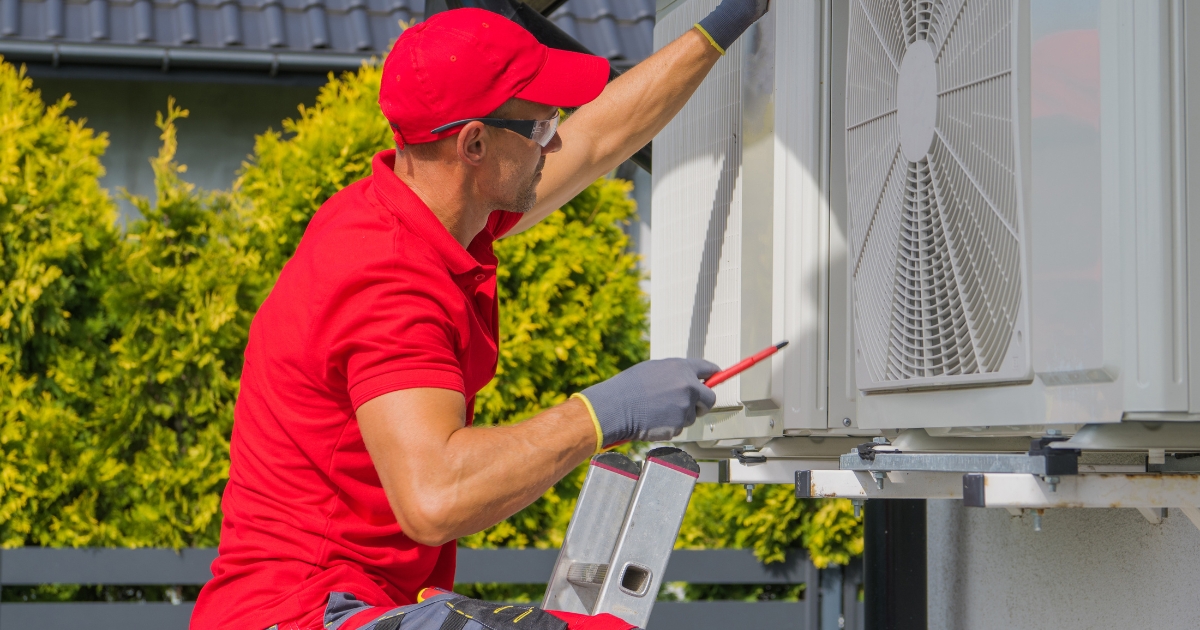Residential HVAC preventative maintenance checklist is essential for ensuring the comfort and efficiency of your home. Whether it’s sweltering July or freezing January, a well-maintained HVAC system, including a ready-to-go air conditioner for summer operation, can mean the difference between comfort and chaos.
Here’s a quick rundown of key maintenance tasks you should focus on:
- Spring/Summer: Clean filters, clean coils, check refrigerant, inspect ducts, and clear drain lines.
- Fall/Winter: Replace filters, inspect burner assembly, check heat exchanger, inspect flue system, and check gas pressure.
Maintaining your HVAC system can significantly impact both your comfort and your bank account.
By scheduling routine upkeep during the appropriate seasons, you can reduce energy consumption, extend the life of your system, and improve indoor air quality—all while minimizing costly repairs. Inefficient systems tend to eat up energy, leading to high bills and frequent breakdowns.
Regularly addressing HVAC maintenance ensures not just a consistently comfortable environment, but also significant energy savings, which is especially crucial in regions with extreme temperature fluctuations, like Central Massachusetts.
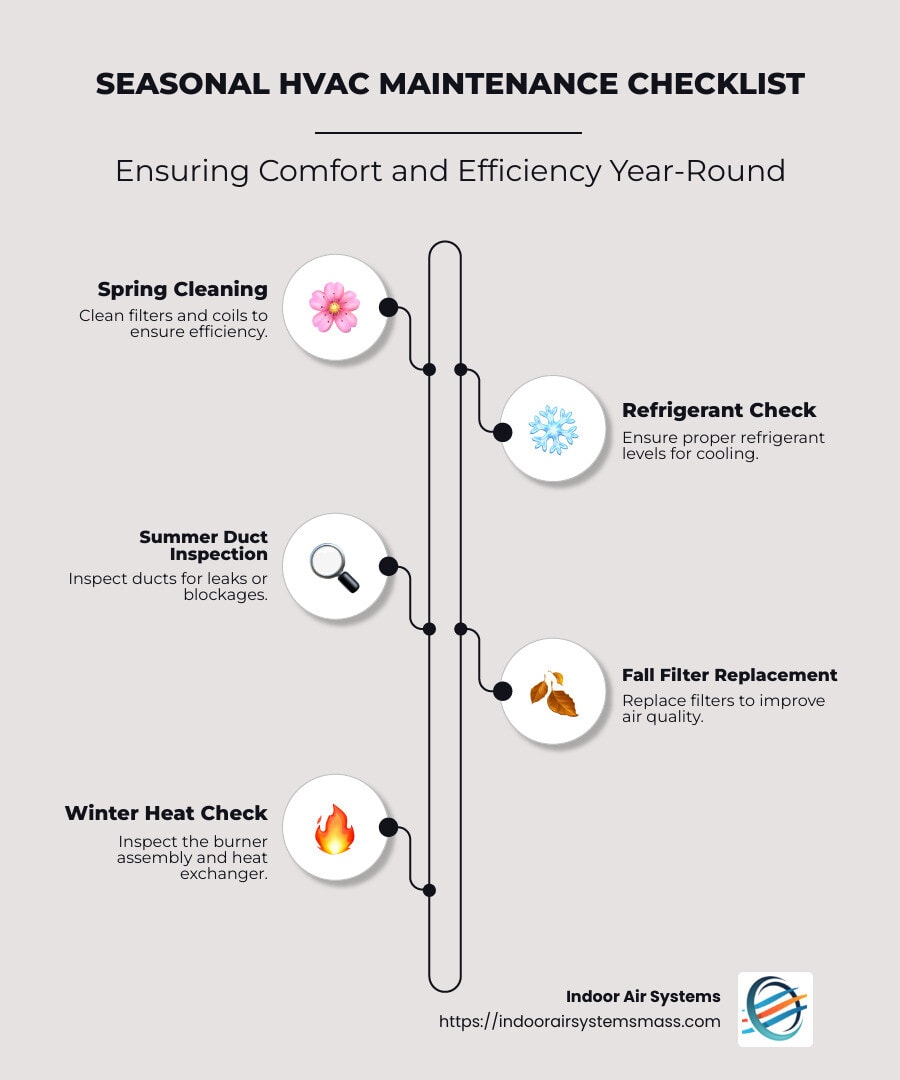
Table of Contents
What is HVAC Preventive Maintenance?
HVAC preventive maintenance is a proactive approach to keeping your heating, ventilation, and air conditioning system in top shape. Think of it as a regular check-up for your home’s comfort system.
Just like you wouldn’t skip an oil change for your car, you shouldn’t skip HVAC maintenance either. Using an hvac preventive maintenance checklist can ensure optimal performance, enhance organizational clarity, and prevent costly breakdowns.
Purpose of Preventive Maintenance
The main goal of preventative HVAC maintenance is to prevent problems before they start. By addressing small issues early, you can avoid bigger, more expensive repairs down the road.
A well-maintained system runs efficiently, saving you money on energy bills and extending the life of your equipment. Plus, it helps keep your home safe, especially if you have a gas furnace where carbon monoxide leaks can be a concern.
Benefits of Regular HVAC Maintenance
- Lower Energy Bills: A clean and well-tuned system uses less energy. This means you’ll see a dip in your monthly utility bills. Maintenance checklists can streamline processes and enhance efficiency by ensuring all tasks are completed systematically. Regular maintenance tasks like changing filters and cleaning coils can reduce energy use by up to 15%!
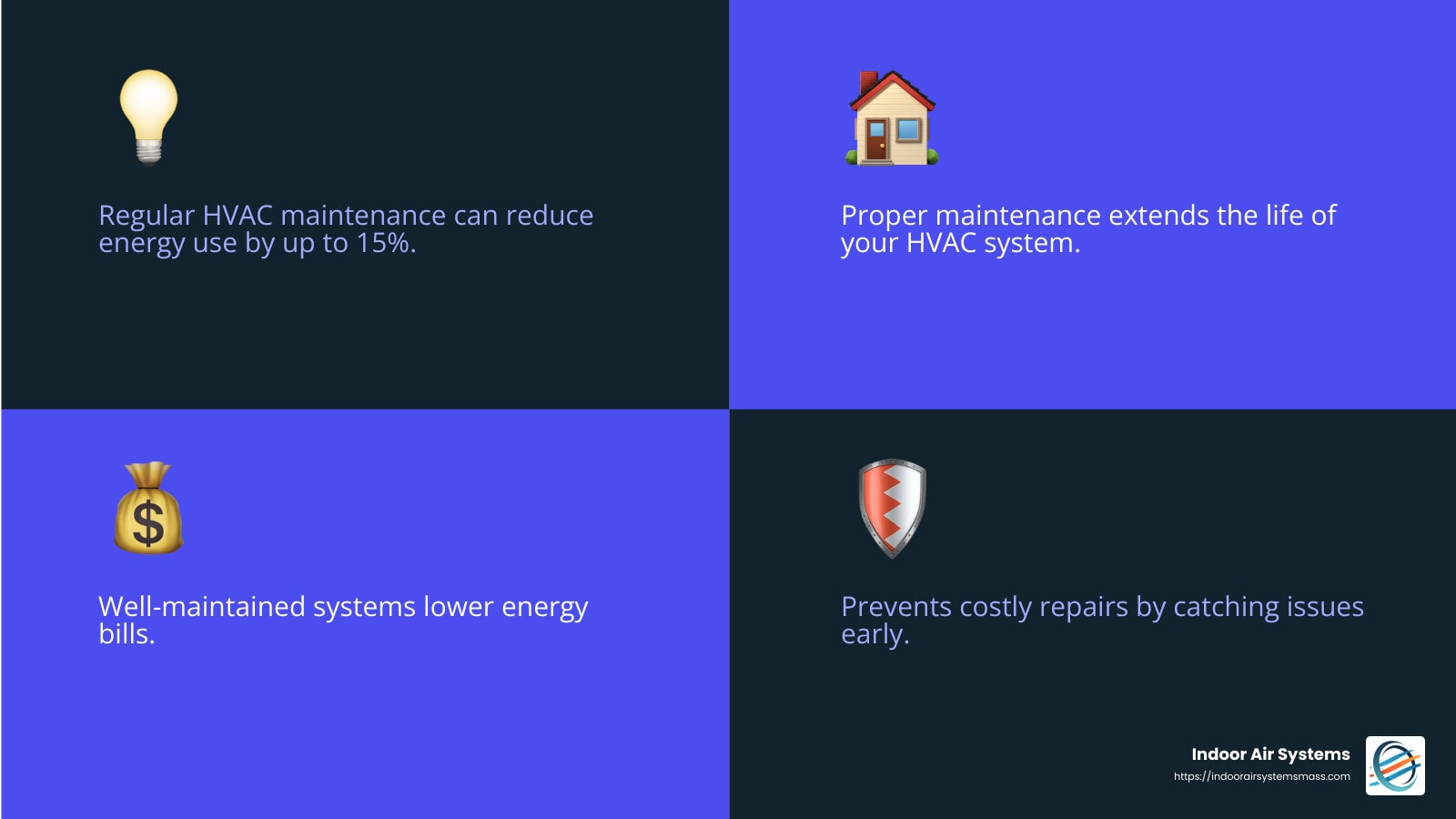
- Reduced Repair Costs: Catching issues early means smaller, less costly repairs. You won’t be left sweating it out in the summer or shivering in the winter waiting for a major repair.
- Extended Equipment Life: Just like how regular exercise keeps you healthy, regular maintenance keeps your HVAC system running longer. This means you won’t have to shell out for a new system prematurely.
- Safety and Compliance: For homes using gas, regular inspections can catch potential hazards like carbon monoxide leaks. Staying on top of maintenance also helps you comply with safety regulations, keeping your family safe.
A little time spent on residential HVAC preventative maintenance can save a lot of time and money in the long run. It keeps your system running efficiently, extends its lifespan, and ensures safety. Plus, you’ll enjoy a comfortable home all year round.
In the next section, we’ll dive into the specifics of seasonal maintenance tasks you can do to keep your HVAC system in peak condition.
Residential HVAC Preventative Maintenance Checklist
When it comes to keeping your home comfortable, following an HVAC maintenance checklist is key to ensuring thorough preventive maintenance and accountability. This checklist is divided into two main parts: Spring/Summer and Fall/Winter maintenance. Each season has specific tasks to ensure your system is running efficiently and safely.
Spring/Summer HVAC Maintenance
As the weather warms up, it’s time to prepare your HVAC system and air conditioner for the demands of summer. Here’s what you should focus on:
- Clean Filters: Dirty filters can reduce airflow and efficiency. Check and replace them every 30-90 days to keep your system running smoothly.
- Clean Coils: Dust and dirt can accumulate on the condenser and evaporator coils. Cleaning these coils improves efficiency and cooling performance.
- Check Refrigerant Levels: Low refrigerant can indicate a leak and affect cooling. Have a professional check and refill it if necessary.
- Inspect Ducts: Look for signs of mold, dust, and debris. Clean ducts ensure good air quality and system efficiency.
- Clear Drain Lines: Blocked drain lines can cause water damage and affect system performance. Make sure they are clear to prevent issues.
- Electrical Connections: Inspect and tighten electrical connections to prevent malfunctions and ensure safety.
Fall/Winter HVAC Maintenance
As temperatures drop, shift your focus to preparing your heating equipment for winter operation:
- Replace Filters: Just like in summer, clean filters are crucial for efficient heating. Replace them regularly to maintain good airflow.
- Inspect Burner Assembly: Ensure it’s clean and functioning properly to avoid ignition problems.
- Check Heat Exchanger: Look for cracks or damage. A faulty heat exchanger can lead to carbon monoxide leaks, posing a serious safety risk.
- Inspect Flue System: Make sure it’s securely attached and free of obstructions to safely vent gases.
- Check Gas Pressure: Proper gas pressure ensures efficient and safe heating. Have a professional inspect and adjust it if needed.
- Lubrication: Lubricate motors, bearings, and other moving parts to reduce friction and wear.
By following this residential HVAC preventative maintenance checklist, you can help ensure your system runs efficiently all year. Regular maintenance not only extends the life of your HVAC system but also keeps your home comfortable and safe.
Next, we’ll explore the benefits of regular HVAC maintenance and how it can save you money and prevent unexpected breakdowns.
Benefits of Regular HVAC Maintenance
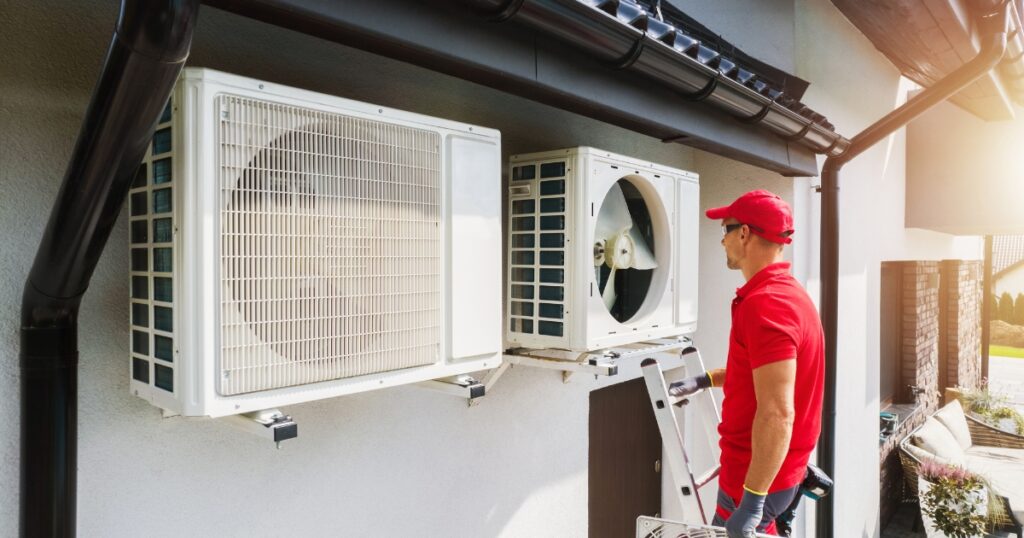
Regular HVAC maintenance is more than just a routine check-up; it’s an investment in your home’s comfort and safety. Maintaining heating elements is crucial to ensure the efficient operation and longevity of heating systems. Here’s why sticking to a maintenance schedule can be so beneficial:
Choosing the Right HVAC System
When it comes to selecting an HVAC system for your home, there are several factors to consider. A well-chosen system can provide efficient heating and cooling, improve indoor air quality, and reduce energy costs.
Consider Your Home’s Size and Layout
The size and layout of your home play a significant role in determining the right HVAC system for your needs. A larger home may require a more powerful system, while a smaller home may be able to get by with a less robust unit.
Additionally, the layout of your home can affect the airflow and distribution of heated and cooled air. For instance, homes with multiple floors or large open spaces may need a system with zoning capabilities to ensure even temperature distribution.
Consider factors such as the number of windows, doors, and the level of insulation in your home when selecting an HVAC system.
Think About Your Climate and Energy Needs
Your local climate and energy needs are also crucial when choosing an HVAC system. If you live in a hot and humid climate, you’ll need a system that can handle high cooling demands efficiently. Conversely, if you reside in a colder region, a reliable heating system is essential.
Consider your energy usage patterns, the number of occupants in your home, and your budget. For example, a heat pump might be an excellent choice for moderate climates as it provides both heating and cooling, potentially reducing energy costs.
Research Different Types of HVAC Systems
There are several types of HVAC systems available, each with its own strengths and weaknesses. Some common types include:
- Split Systems: These consist of an outdoor compressor unit and an indoor air handler unit. They are popular for their efficiency and flexibility.
- Packaged Systems: These combine the compressor, coil, and fan in a single unit, often installed on the roof or a concrete slab near the foundation. They are ideal for homes with limited indoor space.
- Heat Pumps: These use refrigeration technology to provide both heating and cooling. They are highly efficient and suitable for moderate climates.
- Ductless Systems: These use individual units to provide heating and cooling to specific zones in your home, offering excellent flexibility and energy efficiency.
Research each type of system to determine which one best fits your needs and budget. Consulting with an HVAC professional can also provide valuable insights tailored to your specific situation.
Lower Energy Bills
A well-maintained HVAC system runs more efficiently, which means it uses less energy. When systems are clean and parts are in good working order, they don’t have to work as hard to heat or cool your home. This efficiency can lead to significant savings on your energy bills over time.
Reduce Repair Costs
Catching small issues before they become big problems is key to avoiding costly repairs. Regular maintenance allows you to spot signs of wear or malfunction early. For instance, replacing a worn-out belt is much cheaper than fixing a broken motor. Preventive maintenance helps keep repair costs down by addressing these minor issues before they escalate.
Extend Unit Life
Your HVAC system is a significant investment, and you want it to last as long as possible. Routine maintenance can extend the life of your unit by ensuring that all components are operating smoothly. By investing a little time and money into regular check-ups, you can delay the need for a costly system replacement.
Safety
Safety is paramount, especially if your system uses gas. Regular inspections can identify potential hazards like carbon monoxide leaks, which can be life-threatening. Ensuring that your system is safe and compliant with industry standards protects you and your family.
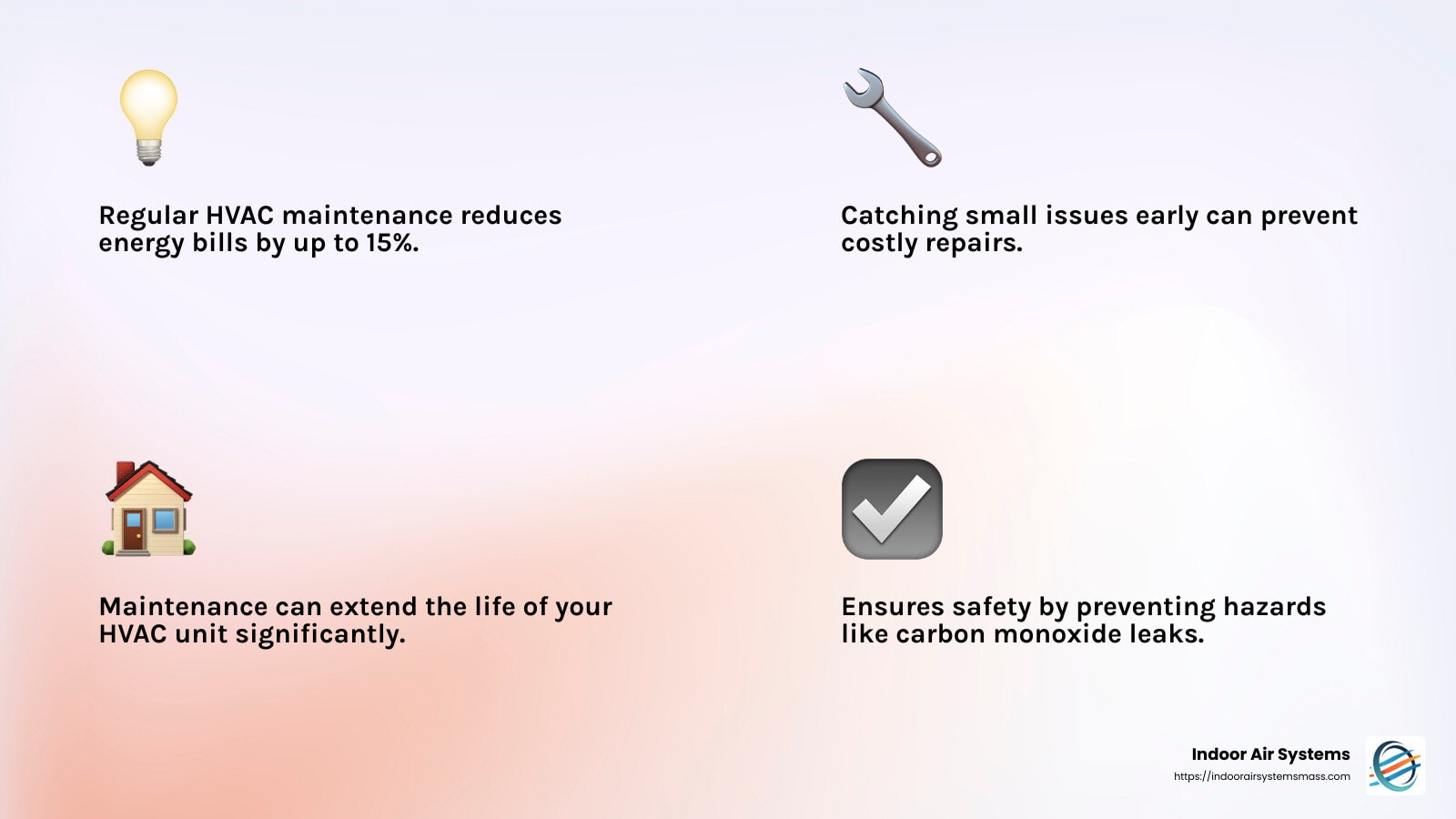
By maintaining your HVAC system, you not only ensure comfort but also peace of mind. Next, we’ll look at the differences between DIY and professional maintenance, and when it might be time to call in the experts.
Tips for Improving Air Quality and Energy Efficiency
Improving air quality and energy efficiency is crucial for maintaining a healthy and comfortable home. Here are some tips to help you achieve these goals:
- Regularly Change Your Air Filters: Dirty air filters can restrict airflow and reduce the efficiency of your HVAC system. Change your filters every 30 to 90 days to keep your system running smoothly and to improve indoor air quality.
- Install a Programmable Thermostat: A programmable thermostat allows you to set your heating and cooling schedules according to your daily routine. This can optimize your energy usage and reduce your energy bills.
- Use a Humidifier or Dehumidifier: Maintaining the right humidity level in your home can improve comfort and air quality. A humidifier adds moisture to the air in dry climates, while a dehumidifier removes excess moisture in humid climates.
- Seal Air Leaks and Add Insulation: Prevent heated and cooled air from escaping by sealing air leaks around windows, doors, and other openings. Adding insulation to your home can also help maintain a consistent indoor temperature, reducing the workload on your HVAC system.
- Upgrade to a High-Efficiency HVAC System: If your current system is old or inefficient, consider upgrading to a high-efficiency model. These systems use less energy to provide the same level of comfort, which can significantly reduce your energy costs over time.
By following these tips, you can improve the air quality and energy efficiency of your home, while also reducing your energy costs and extending the lifespan of your HVAC system.
DIY vs. Professional HVAC Maintenance
When it comes to keeping your HVAC system in top shape, there are tasks you can handle yourself and others best left to professionals. Knowing the difference can save you time, money, and stress.
DIY Tasks
Change Air Filters
One of the simplest yet most impactful tasks you can do yourself is changing the air filters. A clean filter improves airflow and efficiency, reducing energy use by 5% to 15% (source). Check your filters monthly and replace them every 30 to 90 days.
Clean Surrounding Areas
Keep the area around your HVAC unit clear of leaves, dirt, and debris. This prevents blockages and ensures your system can operate efficiently.
Monitor for Unusual Noises or Smells
Strange noises or odors can signal a problem. If you notice anything unusual, it might be time to call a professional.
Professional Tasks
Inspect and Clean Coils
Dirty coils can reduce efficiency and increase energy costs. Professionals have the tools and expertise to clean these components effectively.
Check Electrical Connections
A professional can safely inspect and tighten electrical connections, reducing the risk of malfunctions or hazards.
Assess Refrigerant Levels
Checking refrigerant levels requires specialized knowledge and equipment. An HVAC technician can ensure your system is properly charged and identify any leaks.
When to Call a Professional
While DIY tasks are great for regular upkeep, some situations require expert attention. Call a professional if:
- Your system isn’t heating or cooling properly. This could indicate a deeper issue that needs professional diagnosis.
- You notice a spike in your energy bills. A sudden increase could mean your system is working harder than it should, possibly due to a malfunctioning component.
- There are persistent strange noises or smells. These could be signs of serious issues, like a failing motor or a gas leak.
- It’s time for seasonal maintenance. Professionals can perform a comprehensive check-up, ensuring your system is ready for the upcoming season.
By balancing DIY efforts with professional services, you can keep your HVAC system running smoothly year-round. Next, we’ll answer some common questions about HVAC maintenance.
Conclusion
In summary, regular HVAC maintenance is not just a task on your to-do list—it’s a smart investment in your home’s comfort and efficiency. By following a residential HVAC preventative maintenance checklist, you can ensure that your system runs smoothly and efficiently throughout the year. This not only helps in reducing energy bills and repair costs but also extends the life of your HVAC unit while ensuring safety.
At Indoor Air Systems, we understand the unique climate challenges faced by residents in Central Massachusetts. Our team is dedicated to providing personalized attention and responsive service, ensuring that your heating and cooling needs are met with precision and care. With over 20 years of experience in residential HVAC services, particularly in mini-split systems, we pride ourselves on delivering quality without the high overhead costs.
Whether it’s a routine maintenance check or an emergency repair, our commitment to excellence ensures that you’re never left in the cold—or the heat. Our personalized approach means we listen to your specific needs and provide solutions that work best for you.
Ready to ensure your home’s HVAC system is in top shape? Contact Indoor Air Systems today for all your heating and cooling needs. Let us help you keep your home comfortable, no matter the season.
Frequently Asked Questions about HVAC Maintenance
What is included in HVAC preventive maintenance?
Preventive maintenance is all about keeping your HVAC system running efficiently and safely. It involves a thorough check of critical components like air filters, coils, and the refrigerant system. Regular inspections help ensure efficient operation and prevent unexpected breakdowns.
A typical residential HVAC preventative maintenance checklist includes:
- Cleaning Coils: Dirty coils can cause your system to work harder, leading to higher energy bills. Regular cleaning helps maintain efficiency.
- Inspecting Electrical Connections: Loose or faulty connections can be hazardous. Professionals check and tighten these connections to ensure safety.
- Lubricating Moving Parts: Proper lubrication reduces friction and wear on motors, prolonging their lifespan.
What are the maintenance requirements for an HVAC system?
To keep your HVAC system in tip-top shape, certain maintenance tasks are essential. These include:
- Wiring and Electrical Connections: Regular inspections ensure there are no loose wires or faulty connections, which can prevent malfunctions.
- Thermostat Calibration: Ensuring your thermostat is accurate helps maintain desired temperatures without wasting energy.
- Heat Pump Inspection: For homes with heat pumps, checking this component is crucial. It ensures the system can efficiently provide both heating and cooling.
What is considered routine maintenance for an HVAC system?
Routine maintenance involves regular tasks that keep your system running smoothly. Here’s what’s typically involved:
- Cleaning Coils: As mentioned, clean coils are crucial for efficiency.
- Inspecting Connections: Regular checks of connections help prevent issues before they escalate.
- Motor Operations: Ensuring motors run smoothly without unusual noises or vibrations is key to system longevity.
- Thermostat Functionality: A properly functioning thermostat is essential for maintaining comfort and efficiency.
Regular HVAC maintenance not only helps in efficient operation but also improves health and safety by reducing the risk of failures. Keeping up with these tasks ensures your system runs smoothly, saving you money and stress in the long run.
Our Content
At Indoor Air Systems, LLC, we provide specialized HVAC services with a personal touch. Serving Central Massachusetts, we focus on the installation and maintenance of mini-split systems, split system air conditioner, heating and cooling system, heating air, ensuring efficient and cost-effective heating and cooling solutions. Our locally owned and operated business allows us to offer exceptional customer attention and responsiveness without the high costs associated with larger companies. Choose Indoor Air Systems for reliable, expert service tailored to your specific needs.

